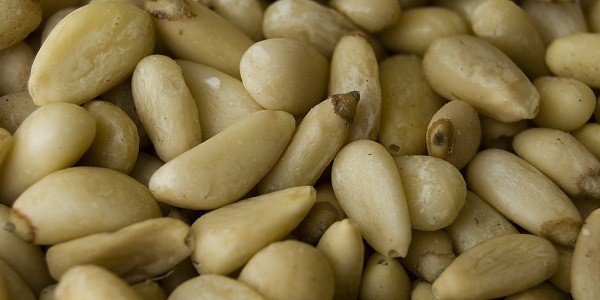Pine nuts

Cedar nuts is the general name of several species of plants of the genus Bor, the so-called cedar pines, which produce seeds suitable for human consumption. In Russia, for example, they call cedar nuts the seeds of the Siberian cedar pine (Pinus sibirica).
Cedar nuts are small, pale yellow grains with a distinctive slightly spicy taste, which are almost always commercially available shelled. Their spicy taste becomes more pronounced when they are baked and begin to release oil.
The Siberian taiga is considered to be the homeland of the cedar, where these majestic trees grow to this day, the age of which can reach over 3000 years.
Cedar nuts – nutritional value per 100 grams
• Proteins – 13.7 grams;
• Fats – 68.4 grams;
• Carbohydrates – 13.1 grams;
• Minerals salts – 2.6 grams;
• Water – 2.3 grams;
• Caloric content – 673 kilocalories;
Cedar nuts contain a large amount of fat and carbohydrates, and that is why their caloric content in dried and raw form is so high – 673 kilocalories per 100 grams.
There are slightly fewer calories in cedar flour, 432 kilocalories per 100 grams. Excessive consumption of pine nuts can cause obesity.
Are pine nuts useful?
Pine nuts primarily contain fats, lecithin, nitrogenous substances – proteins, carbohydrates, mineral salts, glucose, fructose, sucrose, starch, dextrin, pentosans and vegetable fibers .
Cedar nut is also a source of such macroelements as phosphorus, magnesium, potassium, sodium and calcium and the following microelements – iron, manganese, copper, zinc, mobileden, silicon, aluminum, iodine, boron, nickel, cobalt, lead, strontium, silver.
Even the shell of the cedar seeds contains macro and microelements vital for humans, such as phosphorus, sulfur, calcium, potassium, iron, manganese and silicon.
From 100 grams of pine nuts, a person can get such a quantity of deficient microelements that would satisfy the body’s needs for one day of manganese, copper, zinc and cobalt.
The presence of 14 amino acids was found in the proteins of pine nuts, 70% of which are essential, one of them is arginine /about 20% of the total protein content/.
Cedar nuts contain practically all essential amino acids, polyunsaturated fatty acids, vitamins A, B, C, D, E, P. The biological value of these walnuts is determined by the high content of vitamin B1 and tocopherol.
The shells of pine nuts are rich in tannins. From them they prepare infusions and decoctions, which are applied to inflammations of the mucous membranes of the mouth and other organs in the form of lotions for smearing and washing – for skin diseases / herpes, lichen, purulent lesions, eczema, etc./
Infusion of pine nut shells has been used in folk medicine to treat upset stomachs as well as other conditions causing unpleasant gastrointestinal symptoms.
Cedar nuts must be included in the diet of children and adolescents. They have a beneficial effect on the physical and mental development of children. They are very useful and necessary during the period of changing milk teeth.
The use of cedar pine seeds increases the body’s defenses, strengthening the immune system. They also enhance male potency.
Contraindications
After using pine nuts, many people experience unpleasant symptoms characteristic of poisoning and intoxication of the body.
For more than a week, some of them feel an unpleasant bitterness in the mouth, which intensifies after consuming sweets. But this phenomenon has not been solved to this day.



